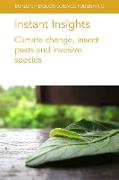This specially curated collection features three reviews of current and key research on climate change, insect pests and invasive species.
The first chapter reviews the impact of climate change on insect pests and how it has affected insect pest development and population dynamics, activity and abundance, diversity and geographical distribution. It also assesses insect-host plant interactions and the effectiveness of crop pest management techniques.
The second chapter discusses the literature on the potential impact of climate change on the principal insect pests of wheat, including cereal aphids, Hessian fly, orange wheat blossom midge, cereal leaf beetle and cotton bollworm. It assesses the different methods used to assess likely impacts as well climate change effects on biological control in wheat systems.
The final chapter surveys what we know about the ecology of invasive species and potential management strategies. In particular, it assesses how integrated pest management (IPM) needs to evolve to deal with invasive species, particularly in focussing more on monitoring, prevention and rapid response.


